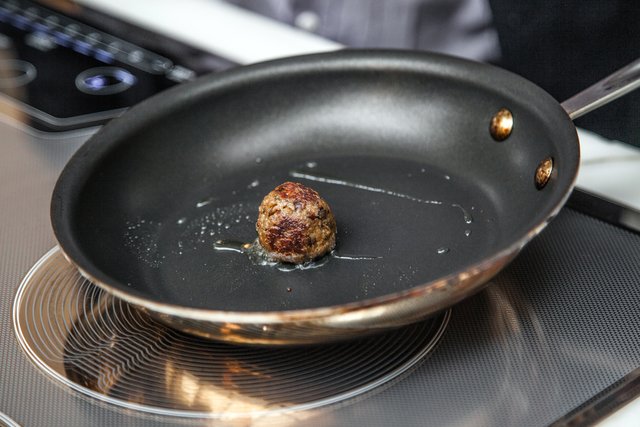Fate of Food: Amanda Little Reports on Lab-Grown Meat

As the technology grew, the human culture also became more civilized. What used to be standard practice in conflict is now considered war crime. La grown meat is something loved and envisioned among a range of people from science fiction/technology lovers to animal lovers. Memphis Meats is a startup trying to make this into a reality.
Co-founded in 2015 by Uma Valeti, an Indian-born cardiologist, and Nicholas Genovese, a stem cell biologist, Memphis Meats is the world’s first start-up to grow meat in a laboratory using tiny samples of muscle, fat, and connective tissues taken from living animals. “We are a meat, poultry, and seafood company that makes end products no different than conventional meat, while eliminating the need for animal slaughter,” Valeti tells me in a phone call before my visit.
He adds that the cells that are grown, or “cultured,” in his laboratories are “alive,” even though they’re not attached to the animal. They’re so alive, in fact, that the mature muscle tissue he produces actually responds — as in flexes, or spasms — when stimulated. The notion that a serving of cultured meat had once been flexing in a petri dish would send me running to the tofu section, I tell Valeti. But he goes on to outline the many benefits that might coax me right back: “Cultured meats are identical on a cellular level to animal meats and can be as or more nutritious and delicious,” he says.
There are other advantages of this too. Livestock production accounts for about 15 percent of all greenhouse gas emissions globally, more than all forms of transportation combined. People are too biased and attached towards their burgers and they never seem to talk about this like they talk about oil and cars.
Valeti holds that the production process for cell-based meats could reduce the greenhouse gas emissions from meat production by more than three quarters, while also cutting associated water use by up to 90 percent. Cultured meats could also eliminate the risk of bacterial contamination (gone would be the threat of E. coli and the helping of feces) and reduce the risk of heart disease and obesity (fats and cholesterol levels in these meats can be controlled). “We’re talking about changing the lives of billions of humans and trillions of animals,” Valeti tells me.
This is one side of science and technology that I want to see being developed as fast as possible (even more than space travel) There are many immediate real world benefits of such technology.
Source of shared Link

Hi, @vimukthi!
You just got a 3.13% upvote from SteemPlus!
To get higher upvotes, earn more SteemPlus Points (SPP). On your Steemit wallet, check your SPP balance and click on "How to earn SPP?" to find out all the ways to earn.
If you're not using SteemPlus yet, please check our last posts in here to see the many ways in which SteemPlus can improve your Steem experience on Steemit and Busy.
Hi @vimukthi!
Your post was upvoted by @steem-ua, new Steem dApp, using UserAuthority for algorithmic post curation!
Your UA account score is currently 4.368 which ranks you at #2565 across all Steem accounts.
Your rank has not changed in the last three days.
In our last Algorithmic Curation Round, consisting of 111 contributions, your post is ranked at #72.
Evaluation of your UA score:
Feel free to join our @steem-ua Discord server